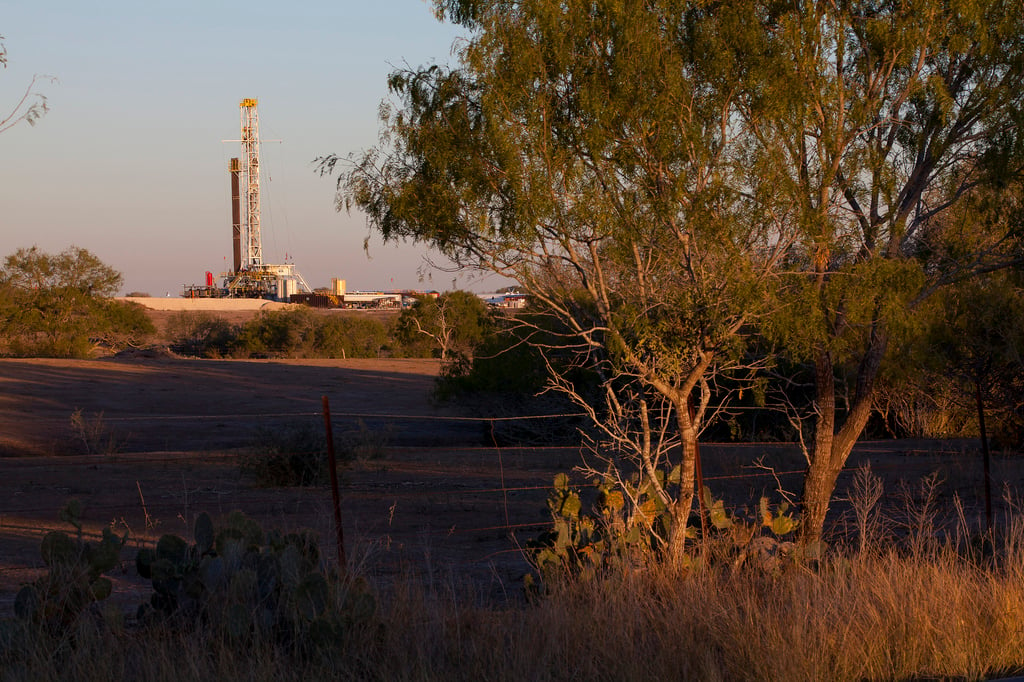
A hydraulic fracturing drill on the Texan side of the Eagle Ford shale field. It’s predicted that large amounts of natural gas waits to be drilled on the Mexican side of the field (Photo: Marathon Oil Corporation via Flickr).
When Mexico passed legislation last month lifting a 75-year ban on foreign energy investors, oil companies from around the world awoke to the untapped potential of a new market now up for grabs.
President Enrique Peña Nieto kicked off his six-year term just over a year ago, promising economic improvement and an aggressive reform agenda. His platform included changing a law enacted in 1938, which barred outside companies from drilling for Mexican energy resources both offshore and inland. Now in effect, the change is predicted to bring up to $20 billion in foreign investment over the next two years.
Currently the ninth largest oil-producing country in the world, petroleum once represented 75 percent of Mexico’s exports. Lacking equipment and technology, however, production rates have long been on the decline for Mexico’s state-run oil monopoly, Pemex. For instance, Mexico authorized just three new shale oil and gas wells in 2012. The U.S. approved 9,100.
José Luis Sánchez Mosqueda, a well engineer on the Centenario platform, told Joshua Partlow at the Washington Post, “The easy oil is all gone. We need to get unconventional oil.”
It is possible Mexico opened its energy market to the world hoping U.S. companies will bring fracking technology south. Hydraulic fracturing is a technique Pemex has not been able to employ and is likely why oil production is falling, — the vast Eagle Ford shale field, for example, remains untouched.
Eagle Ford is one area that could be an early target for foreign investors. The field starts in southern Texas and spreads south of the Rio Grande into Mexico. The Mexican side of the reserve promises to be full of cleaner-burning fuel. However, with natural gas so cheap and abundant in the U.S., some are wondering whether investors will want to leave their own backyard to drill.
For a country that used to be difficult to trade with due to high tariffs and state-owned enterprises, some are claiming Mexico’s move to be the most significant economic reform since the nation joined the North American Free Trade Agreement in 1994.
Now that Mexico’s Congress has lifted the ban on foreign investors in its energy sector, companies around the world are considering bidding on initial drilling contracts. Mexican policymakers were sure to write into the bill that investors buying contracts were entering a profit-and-production-sharing agreement. That means Mexico will maintain ownership of all energy resources in the ground and will sell the rights for companies to bring that energy to the surface.
Currently nearly one-fourth of U.S. oil production comes from American territory in the Gulf of Mexico. The opportunity for U.S. companies to drill farther south into Mexico offers an incentive to expand offshore drilling.
The recently passed law will allow companies like Exxon Mobil and Chevron, as well as midsize U.S. companies, to develop largely unexplored areas for fossil fuels.
Energy firms outside of North America are also looking to break into Mexico’s newly opened market. One company eyeing the opportunity of high-energy output in Mexico is Italy’s Eni S.p.A., which announced January 14 it met with top Pemex officials about possible collaboration once the oil market is officially open for business. The two companies discussed potential oil exploration and production partnerships.
Under guidelines of the new legislation, Pemex has first dibs on drilling grounds it wishes to maintain, but must prove it has the financial capacity and technological ability to do exploit them.
Before jumping into Mexican oil fields headfirst, investors are waiting to see terms for secondary laws that will accompany the ban lift, including the adoption of a competitive tax structure when contracts are drawn up.
“While the state will continue to have a major role, there will no longer be just a single operator in Mexico,” Fluvio C. Ruiz Alceron, a director at Pemex, told Nick Snow of Oil&Gas Journal. “Pemex will need to change from a public entity to a productive state enterprise.”